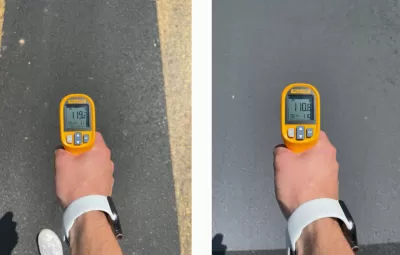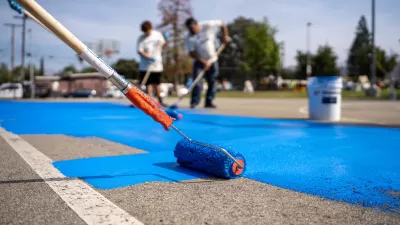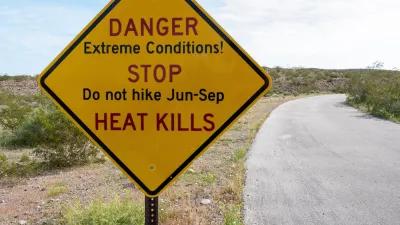A ten-block area in one of L.A.’s most heat-prone neighborhoods saw significant reductions in surface and air temperature thanks to an innovative street treatment that could help communities around the country mitigate the impacts of extreme heat.

Following up on a story Planetizen shared last August, Planetizen editor Diana Ionescu spoke with Jeff Terry, VP of CSR & Sustainability at GAF about new data that shows the quantifiable impacts of the GAF Cool Community initiative undertaken in Pacoima, a community in the San Fernando Valley in Los Angeles, California.
According to Terry, a year after the application of 700,000 square feet of a reflective street treatment in a 10 square block area, the treatment was found to reduce surface level temperatures by as much as 10 degrees and ambient air temperatures by around 1.5 degrees on sunny days, with a reduction of up to 3.5 degrees on the most extreme days. The epoxy acrylic coating, whose maintenance schedule Terry says lines up with the average lifespan of street pavement, lightens the surface and helps prevent heat absorption into hard surfaces, so the pavement warms up more slowly and cools down faster. Anecdotally, Terry says park staff reported being able to schedule more activities thanks to more comfortable spaces.
The project is a partnership between Global Cool Cities Alliance, Climate Resolve, GAF, Pacoima Beautiful, Urban Semillas, Councilwoman Monica Rodriguez, StreetsLA, LA Department of Recreation & Parks, and the Los Angeles Unified School District—a broad coalition of local entities coming together to implement the project across different properties. Terry praised the community-wide approach taken by Pacoima, which can provide more effective cooling at a larger scale, particularly when projects move beyond cool pavements to cool roofs and other innovations that fight the urban heat island effect.
The project is collecting data in the project area and a nearby neighborhood with similar temperatures, as well as gathering more subjective benefits such as outdoor comfort and heat awareness among residents. A ‘playbook’ created for the Pacoima project outlines the planning and implementation process and provides guidance for replicating the program in other communities.
The Pacoima project, Terry says, is an effective example of a public-private partnership that leveraged key relationships with community advocates, government partners, local elected officials, and individual residents to understand the community’s needs and provide information about the impacts of extreme heat. In Terry’s experience, the project was welcome by most stakeholders, but for many communities key challenges such as a lack of awareness and understanding of the true impacts of heat, a lack of funding that addresses the urgency of cooling solutions, and the difficulty of coordinating among different agencies and property owners remain.
As extreme heat becomes a top public health risk, officials are building a growing toolkit for combating the effects of heat and retrofitting cities with green spaces, cool surface treatments, and sustainable infrastructure that can withstand heat, fire risk, and high power demand.

Planetizen Federal Action Tracker
A weekly monitor of how Trump’s orders and actions are impacting planners and planning in America.

Maui's Vacation Rental Debate Turns Ugly
Verbal attacks, misinformation campaigns and fistfights plague a high-stakes debate to convert thousands of vacation rentals into long-term housing.

Cuomo Is the Candidate of Both NIMBYs and Developers. What Gives?
In the New York City mayoral race, odd bedfellows align to preserve the housing status quo.

Amtrak Rolls Out New Orleans to Alabama “Mardi Gras” Train
The new service will operate morning and evening departures between Mobile and New Orleans.

The Subversive Car-Free Guide to Trump's Great American Road Trip
Car-free ways to access Chicagoland’s best tourist attractions.

San Antonio and Austin are Fusing Into one Massive Megaregion
The region spanning the two central Texas cities is growing fast, posing challenges for local infrastructure and water supplies.
Urban Design for Planners 1: Software Tools
This six-course series explores essential urban design concepts using open source software and equips planners with the tools they need to participate fully in the urban design process.
Planning for Universal Design
Learn the tools for implementing Universal Design in planning regulations.
Heyer Gruel & Associates PA
JM Goldson LLC
Custer County Colorado
City of Camden Redevelopment Agency
City of Astoria
Transportation Research & Education Center (TREC) at Portland State University
Jefferson Parish Government
Camden Redevelopment Agency
City of Claremont






























